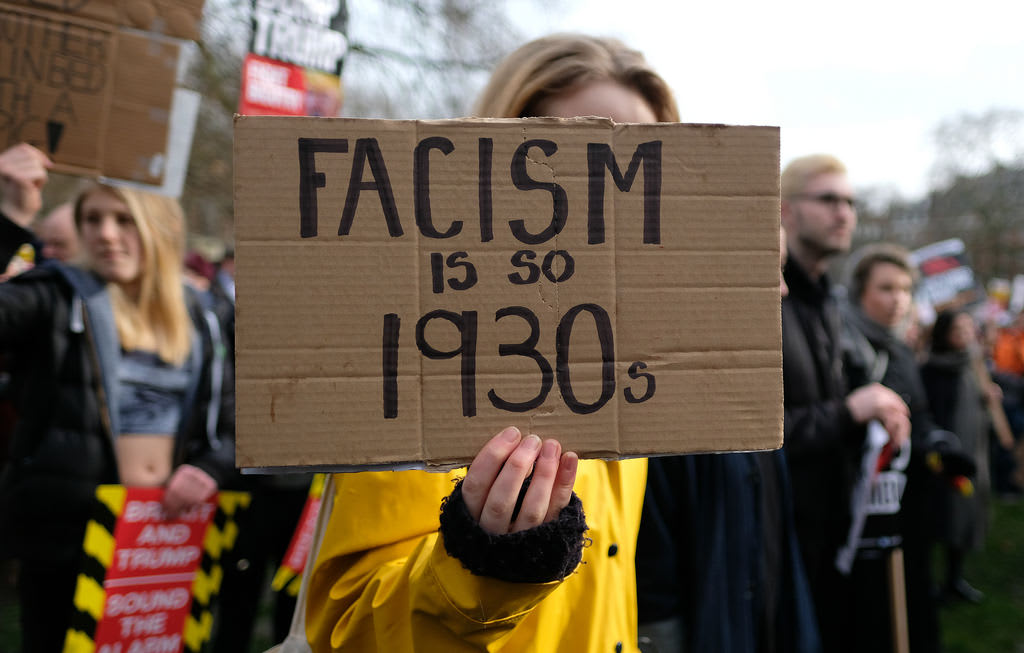The Rise of 20th Century Fascism
Was it triggered by the rise of the radical left?

To acolytes of Fascist ideology, the First World War served to reiterate their deep-seated belief that Liberal Democracy was essentially antiquated. They believed a heavily nationalistic, autocratic form of authoritarianism was required to transmogrify Europe; redefining the traditional constructs of social order in the process. Michael Mann in his book ‘Fascists’ discusses the rise of right wing authoritarianism through his IEMP model, this model refers to the means and distributions of social power; Ideological, Economic, Military and Political. I will be drawing upon the Mann’s IEMP model to coherently discuss the role that fear of the revolutionary left played in the proliferation of Fascism during the 20th century.
To answer the question successfully I believe it is auspicious to firstly examine whether Fascism was predominantly revolutionary or reactionary dogma. Dylan Riley writes ‘If Fascism was revolutionary then it belongs with communism:’ Riley’s inquest is based on the anti-feudal, anti-monarchical, anti-capitalist principles coherent in Fascism. Hitler’s destruction of the banking establishments reiterates this revolutionary view; however it is important to recognize that Hitler was philosophically a Nationalist Socialist not a Fascist. Riley continues to state ‘If, on the other hand Fascism was counter-revolutionary then it’s place in European History looks quite different.’ Riley is insinuating that if Fascism was indeed a born out of reactionary ideals, it thus doesn’t serve to warn future generation against the dangers of revolutionary ideology, acting more-so as a pre-cursor for modern day Liberal Democracy. From a Marxist perspective Fascism is wholly reactionary; the increasing of class division through sociological collaboration rather than moving towards classless society representing a backwards, traditional outlook. Arguably Fascism was ‘conceived’ through fears of Bolshevism and early Republicanism, however it’s necessary to acknowledge Fascism’s defining characteristics such as totalitarianism, anti-feudalism and anti-monarchy are revolutionary ones. Furthermore it is necessary to appreciate that the different brands of Fascism prioritised different characteristics; Francoism was inherently reactionary, whereas Mussolini seemed to mix and match tradition with more forward thinking, revolutionary ideals. Robert Paxton sums it up perfectly; ‘If fascism was “revolutionary,” it was so in a special sense.’
Though the ideologies of Communism and Fascism are unequivocally on opposite sides of the political compass, their histories are arguably wholly intertwine. Their reactionary foundations creating a reliant relationship, with each ideology struggling to progress without the other. Michael Parenti writes ‘Mainstream writers feel free to treat fascism and communism as totalitarian twins.’ Both believed in reconstructing the very order of society, deploring the bourgeoisie middle classes in order to fix the inconsistencies of capitalism. Former Trotskyite Peter Hitchens reiterated this view in a Question Time debate with George Galloway; explaining that without Bolshevik revolution there very possibly wouldn’t have been a popular uprising towards Fascism in Europe. It is however important to also accede the counter argument; namely that without the far left I may be writing this essay in German.
Francoist popularity in Spain was undoubtedly conceived predominantly out Communist fear; mainly because Franco lacked any consistent political ideology other than anti-communism and anti-anarchism: The civil war Franco’s crusade against the evils of Bolshevism. Franco’s fear of the far-left was congruous with Western opinion; Robert Paxton writes ‘Many of them (Western Conservatives) might find Fascists useful, or even essential, in their struggle for survival against dominant liberals and a rising Left.’ This reiterates the fact that during the interwar period many intellectuals accepted Fascism as the only plausible stand against the rising left; the lesser of two evils as it were. The Western powers viewed Bolshevism as the immediate threat in Europe; watching fearfully as Tsar Nicholas II was executed and his two daughters mercilessly bayoneted. This led to a period of underlying bias towards Fascism; reiterated in 1938 with Adolf Hitler being voted Times ‘Man of the year.’ Fear of communism was not limited to solely political fear; Parenti writes ’Ruling classes throughout the world hate and fear communism not for its lack of political democracy, but because it attempts to establish economic democracy.’ The far-left ideals were an antithesis of Western capitalism, with the intellectual middle classes wary of its dispersion. It wholly evident that it was frightened-liberals, opportunists and technocrats that helped fascism come to fruition: Di Lampedusa summed the mood of the time up perfectly; ‘If we want things to stay as they are, things will have to change.’
Despite fear of the far-left undoubtedly influencing the advancement of Fascist thought; there were other further factors that simply cannot be overlooked. The period of economic downturn known as the Biennio Rosso was abundant with strikes, widespread unemployment and occupations were common. Mussolini’s seizure of power in 1922 brought with it a stage of economic corporatism; a policy of classic-liberal almost Laissez-faire economics which promised to combat the rising inflation and debt. This policy failed however, leading to the government to follow interventionist, collectivist policies in regard to industry and agriculture. This interventionist style of policy was reiterated in a military sense; with interference in Abyssinia in 1935 and Albania in 1939 verifying this. Though that state of the economy in Italy is undoubtedly a factor in the rise of Fascism; it is important to acceded that Italy’s economy in 1939 was still vastly substandard, and nothing in comparison to the industry growth of Hitler’s Germany. Historian Denis Mack Smith writes the following; ‘Successes that were nothing more than illusionary propaganda, won at the expense of the Italian economy.’ It was arguably Mussolini’s economic ideology, and utopian promises that proved more persuasive than his tangible economic contributions, exploiting the state’s economic weakness with romanticised ideals. It is however of interest to note that whereas historically coups and revolution were congruent in backwards countries, this is not necessarily the case in regard to Fascism: Michael Mann writes ‘The countries with the biggest fascist movements were at all levels of economic development.’ Though the interwar economic crises delegitimised government, it doesn’t directly explain Fascism’s rise.
Democracy by definition is simply not compatible with Fascism, meaning for Fascism to flourish there has to be a state feeling of anti-governmental anarchism. The destabilized governments of Germany and Italy, and declining relevance of classical-liberal policy created an atmosphere coherent with the prevalence of extremism. History reiterates the fact that in an anarchistic society citizens turn to revolutionary means; Napoleon and Stalin both examples. Hitler’s revolutionary ideals were seen by the public as vastly superior to a government responsible for signing the Treaty of Versailles and the War Guilt clause, and Mussolini’s constant referral to the greatness of the Roman Empire stirred a sense of traditional Romanticism. This traditional outlook was affirmed through Fascism’s relationship with the Catholics church. Franco professed the defence of Christian civilisation throughout the civil war, the Catholic Church in Quebec viewed Nazism as the protector over ‘Godless Communists,’ and the Lateran Treaty affirmed the churches own empathetic views of Fascism. The clerical fascist period in wartime Croatia; in which economic and political ideology of Fascist policy was combined with clerical teaching further proved this. Volatile public opinion towards the German and Italian governments can be attributed to the rise of Fascism; however I see it as more long term than that. Ideologically from 1880 onwards there was revolt against values such a materialism and rationalism. This theme known as fin-de-siècle saw a rise in romantic, emotional and irrational ideals, all of which prevalent in Fascist thinking. The short-term governmental failings of the time sought only to affirm these deep-seated ideals, however these sentimentalized ideals had been brewing for a long time.
World War One brought with it a rise in war veterans: Veterans had expected to be fighting a traditional glorified European war; however the brutal carnage that ensued created a group of confrontational, anti-government and highly militarised veterans. Fascisms’ militaristic emphasis essentially took advantage of this, in a sense embodying the war-mongering feeling that these veterans had become accustom too. There is thus an inherent relationship between war veterans and the expansion of Fascist politics. Angel Alcade writes ‘The decision of both Fascist Italy and Francoist Spain to grant the status of party members to all the war veterans in December 1939 bears testament to the proximity of the regimes in this period.’ This importance of veterans in fascist society described by Alcade was reiterated on the 25th August 1939, with a law being passed in Spain reserving jobs for Francoist disabled veterans whilst also granting unemployment benefits to those that couldn’t work. Alcade writes ‘During the early 1940s, the wide inclusion of war veterans in many local councils in most Spanish provinces allowed certain Francoist veterans to reach positions of political power within the regime. This widespread inclusion of veterans in Spanish politics, especially on a local level; led to a political sphere dominated by figures highly loyal to Franco. The undoubted influence of war veterans on Spanish post-war politics is emphasized by the small Zaragozan town of Letux, where in 1945 all 7 members of the local council were war veterans.
Post World War One, in both Germany and Italy there was a real issue with depleted national pride. Paxton writes ‘The plummet in German fortunes from the bold Great Power of 1914 to the stunned, hungry loser of 1918 shattered national pride and self-confidence.’ The defeat was made all the more bitter by the fact that German generals had been professing the inevitable German victory just weeks before defeat. In the case of Italy the Allies didn’t honour their promise to grant Italy Trentino, South Tyrol, Istria, Trieste, part of Dalmatia, Adalia, some of the Agean Islands, and the status of protectorate over Albania. This attack on Italian national pride could seemingly only be remedied by the intense nationalism apparent in Fascism, with the constant referral to the greatness of the Roman Empire stirring up an illusion of state dignity.
To conclude I feel it’s totally incorrect to attempt to pin Fascism’s rise on one specific cause; due to the fact it largely rests largely on interpretation and opinion. I prefer to view the causes as long and short term elements, that when combined created both environment and motive in which extremist philosophy could flourish. The consistent long-term failings of Liberal democracy; socially, economically and politically lay the grounding for visionary ideology to thrive. However we cannot ignore the short-term influence; that essentially created the means for Fascism to come to fruition: The world war created economic frailty, political unrest and social groupings eager for extremist ideology, with the tendencies of Fascism promising to solve these issues. In my opinion it was the rise of leftist extremism that led to practical action, transforming dogma into pragma. Fear of leftist extremism furthermore led Western Europe to essentially turn a blind eye to Fascism, as they were distracted by the more pressing issue of Eastern Europe. It could be argued that this situation is being repeated today, with the UK increasingly distressed with the situation in Russia, whilst feigning ignorance to the state of affairs in the USA.






Comments
There are no comments for this story
Be the first to respond and start the conversation.